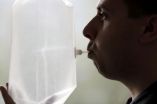(Press-News.org) Progress has been made toward understanding the physiological mechanisms that underlie Gulf War illness and identifying possible treatments, according to a report released Monday by a Congressionally mandated panel of scientific experts and veterans.
Treatment research has increased significantly since 2008, and "early results provide encouraging signs that the treatment goals identified in the 2010 Institute of Medicine report are achievable," the Research Advisory Committee on Gulf War Veterans' Illnesses (RAC) said in a report presented Monday to VA Secretary Eric Shinseki by the Committee's scientific director, Roberta White, chair of environmental health at the Boston University School of Public Health.
The Institute, part of the National Academies of Sciences, had forecast that "treatments, cures, and hopefully preventions" could likely be found with the right research.
The RAC report updates scientific research published since the Committee's landmark report in 2008, which established that Gulf War illness was a real condition, affecting as many as 250,000 veterans of the 1990-91 Gulf War.
"The conclusions of the 2008 RAC report had a substantial impact on scientific and clinical thinking about Gulf War illness, as well as the public acceptance of this disorder," said White. The earlier report documented a number of studies that found evidence linking the illness to exposure to pesticides and pyridostigmine bromide (found in anti-nerve gas pills given to troops), as well as other toxic sources.
"Studies published since 2008 continue to support the conclusion that Gulf War illness is causally related to chemical exposures in the combat theater," White said of the new report. "And many studies of the brain and central nervous system, using imaging, EEG and other objective measures of brain structure and function, add to the existing evidence that central nervous system dysfunction is a critical element in the disorder. Evidence also continues to point to immunological effects of Gulf War illness."
Exposure to the nerve gas agents sarin and cyclosarin has been linked in several studies to changes in magnetic resonance imaging (MRI) that are associated with cognitive impairments -- further supporting the nervous-system effects of those agents cited in the 2008 report.
"The Committee concludes that the evidence to date continues to point to alterations in central and autonomic nervous system, neuroendocrine, and immune system functions," the report says.
Studies also continue to show that Gulf War illness is not associated with psychological stressors during the war, the panel said. Rates of PTSD and other psychiatric illnesses in Gulf War veterans are far below the rate of these disorders in veterans of other recent wars, and far below the rate of Gulf War illness.
In addition, the Committee said, new evidence has emerged suggesting that certain exposures may be linked to brain cancer in Gulf War veterans. Studies show that veterans who were most exposed to the release of nerve gas during the destruction of the Khamisiyah arms depot in Iraq have significantly elevated rates of death due to brain cancer.
Veterans who were exposed to the highest level of contaminants from oil well fires also have increased rates of brain cancer deaths, the report says.
The Committee encouraged studies exposing animals to toxic agents involved in Gulf War illness "because they can help to determine treatment targets in subgroups of veterans with specific exposures, for which there are known mechanistic pathways that cause illness and symptoms."
In addition, "results from this work can be useful in protecting the health of future military personnel who will experience these exposures, as well as non-military populations with occupational or environmental exposures."
The panel cited a number of "promising" treatment studies, including those testing certain dietary supplements, intranasal insulin, and continuous positive airway pressure to ease fatigue and pain and improve cognitive function.
While the RAC panel applauded an increase in the number of treatment studies funded by the Department of Defense's Congressionally Directed Medical Research Program, it expressed grave concerns about a lack of research on other health problems and mortality among Gulf War veterans.
"Very little research" has been conducted to determine rates at which veterans have been affected by neurological diseases such as multiple sclerosis or Parkinson's disease, cancers, and reproductive problems, the panel said.
"No comprehensive information has been published on the mortality experience of U.S. Gulf War era veterans after the year 2000," according to the report.
Gulf War illness refers to the chronic symptoms that affect veterans of that conflict at markedly elevated rates, compared to other veterans' groups and to the U.S. population as a whole. Symptoms can vary from person to person, but typically include some combination of widespread pain, headache, persistent problems with memory and thinking, fatigue, breathing problems, stomach and intestinal symptoms, and skin abnormalities.
INFORMATION:
The full report is available here: http://www.bu.edu/sph/files/2014/04/RAC2014.pdf
The RAC report will be presented at 10:30 a.m. Monday, April 28, at a public meeting of the Committee in Room 230, VA headquarters, 810 Vermont Avenue, Washington, DC. Guest speakers will include U.S. Rep. Mike Coffman, a Gulf War veteran and chairman of the House Veterans Affairs Committee oversight and investigations subcommittee, and AMVETS national executive director Stewart Hickey, also a Gulf War veteran.
Interviews with Professor White may be arranged through the media contact.
Gulf War illness: New report lauds treatment research, confirms toxic causes
2014-04-28
ELSE PRESS RELEASES FROM THIS DATE:
Studies offer insight on how to improve kidney and liver transplantation
2014-04-28
The quality of kidney and liver donations is fundamentally important for the longevity of transplants and the health of recipients. That's why it's critical to know which organs are suitable for transplantation, as well as to use techniques that preserve an organ's function after donation. Several studies published in the BJS (British Journal of Surgery) address these issues and offer ways to maximize the use of donated organs.
In the first study, Rajeev Desai, MRCP, of NHS Blood and Transplant, in the UK, led a team that assessed transplants from 17,639 donors, including ...
R.I. nitrogen cycle differs in bay and sound
2014-04-28
PROVIDENCE, R.I. [Brown University] — Rhode Island's geography is famously small, but new measurements of the nitrogen cycle in its waterways suggest that even over a small distance, differences can be huge. Scientists report that the nitrogen-converting process anammox is almost completely absent in Narragansett Bay, even though it is going strong in Rhode Island Sound only 15 miles off the coast.
The novel and somewhat surprising finding, documented in the journal Limnology and Oceanography, raises intriguing questions about why the bay seems inhospitable to an important ...
Breast cancer patients place huge emphasis on gene expression profiling test
2014-04-28
TORONTO, April 28, 2014—Gene expression profiling tests play a critical role when women with early-stage breast cancer decide whether to have chemotherapy, but many of them do not fully understand what some of the test results mean, new research suggests.
Current guidelines for treating early-stage breast cancer—cancer that has not spread to nearby lymph nodes or other parts of the body—result in thousands of women receiving chemotherapy without benefitting from it.
A gene expression profiling test can help differentiate women who might benefit from chemotherapy versus ...
Increasing sugar concentration in tomato juice
2014-04-28
TOKYO, JAPAN – To increase the sugar concentration and resulting marketability of tomato juice, growers have traditionally used techniques such as subjecting plants to salt and water stresses. In a new study published in HortTechnology (February 2014), Ken Takahata and Hiroyuki Miura from Tokyo University of Agriculture reported on a prototypic method known as "basal wire coiling" that shows potential as a simple and effective method for increasing the sugar concentration in tomato fruit juice.
"We investigated whether coiling wire around the lower part of the plant stems ...
Impact of pelargonic acid for weed control in yellow squash
2014-04-28
DURANT, OK – Growers who produce squash for market are increasingly interested in using more natural herbicides that are also effective in providing season-long weed control, but the options for controlling annual broadleaf weeds in summer squash are currently limited. The authors of a new study say that both organic and conventional producers will benefit from the identification of natural herbicides that effectively provide postemergent weed control. Charles Webber III, Merritt Taylor, and James Shrefler conducted a research study published in HortTechnology to determine ...
Variable gene expression in zebrafish
2014-04-28
This news release is available in German. Early embryonic development of vertebrates is controlled by the genes and their "grammar". Decoding this grammar might help understand the formation of abnormalities or cancer or develop new medical drugs. For the first time, it is now found by a study that various mechanisms of transcribing DNA into RNA exist during gene expression in the different development phases of zebrafish. This study is presented by KIT researchers in the journal "Nature".
After several genomes have been sequenced and human genetic material has been ...
Treat homelessness first, everything else later: Study
2014-04-28
HAMILTON, ON, April. 28, 2014 — Providing safe, stable and affordable housing first is the best way to help homeless in Hamilton, Ont., according to new research.
Researchers from St. Michael's Hospital and McMaster University assessed the success of Hamilton's Transitions to Home program – a program designed to quickly find permanent housing for men who are frequent users of the city's emergency shelter system. Hamilton men who in the last year spent 30 nights or more in emergency shelters or on the streets are eligible for the program, which is run by the city's Wesley ...
Studies presented at ACOG Annual Meeting reveal new information about weight and pregnancy
2014-04-28
CHICAGO – Two studies from the Perelman School of Medicine at the University of Pennsylvania reveal new information about the effects of weight gain and obesity among pregnant women. One study, examining weight gain during pregnancy, shows that despite updated guidelines from the Institute of Medicine (2009), the majority of patients are still unaware of the appropriate amount of weight they should gain. A second study evaluating the implications of prenatal tests on morbidly obese women, reveals the importance of testing for this group of patients who are at an increased ...
Two breath compounds could be associated with larynx cancer
2014-04-28
Researchers at the Rey Juan Carlos University and the Alcorcón Hospital (Madrid) have compared the volatile substances exhaled by eleven people with cancer of larynx, with those of another twenty healthy people. The results show that the concentrations of certain molecules, mainly ethanol and 2-butanone, are higher in individuals with carcinoma, therefore they act as potential markers of the disease.
Human breath contains thousands of volatile organic compounds (VOC) and some of them can be used as non-invasive biomarkers for various types of head and neck cancers as ...
Transplant success tied to naturally high levels of powerful immune molecule package
2014-04-28
April 28, 2014 AUGUSTA, Ga. - Patients with highest levels of the most powerful version of the immune molecule HLA-G appear to have the lowest risk of rejecting their transplanted kidney, researchers report.
A study of 67 transplant patients – 50 with no evidence of rejection and 17 with chronic rejection – showed those most tolerant of their kidney had naturally high levels of HLA-G dimer, where two of the immune molecules bind together, said Dr. Anatolij Horuzsko, immunologist at the Medical College of Georgia at Georgia Regents University.
Knowing which form of HLA-G ...





